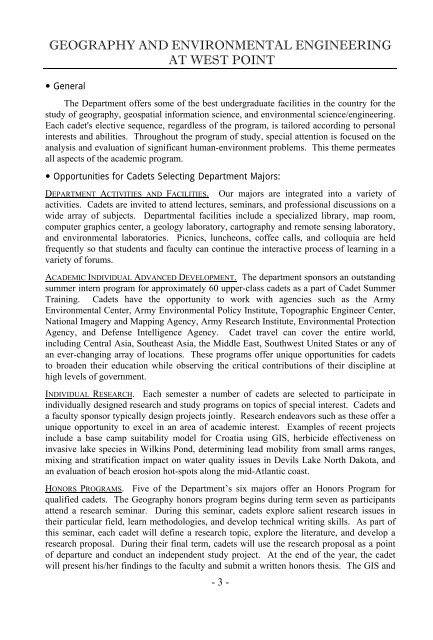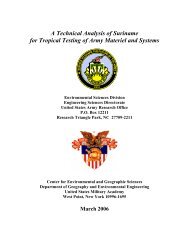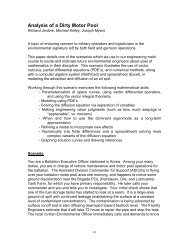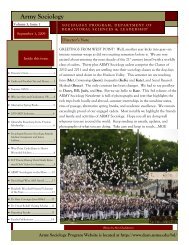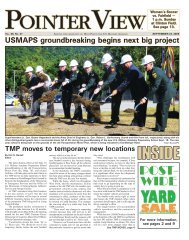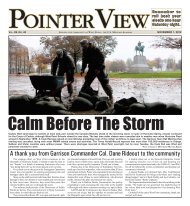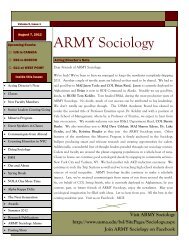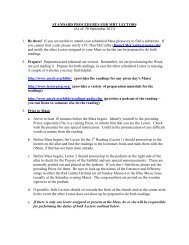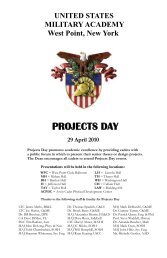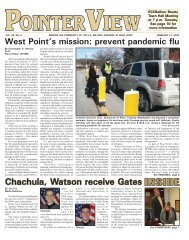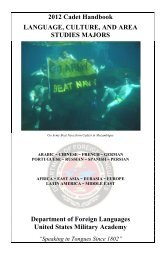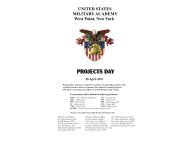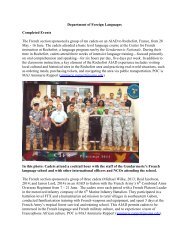GENE Catalog (aka Grey Book): Class of 2010 - West Point
GENE Catalog (aka Grey Book): Class of 2010 - West Point
GENE Catalog (aka Grey Book): Class of 2010 - West Point
- TAGS
- gene
- catalog
- grey
- class
- www.usma.edu
Create successful ePaper yourself
Turn your PDF publications into a flip-book with our unique Google optimized e-Paper software.
GEOGRAPHY AND ENVIRONMENTAL ENGINEERING<br />
AT WEST POINT<br />
� General<br />
The Department <strong>of</strong>fers some <strong>of</strong> the best undergraduate facilities in the country for the<br />
study <strong>of</strong> geography, geospatial information science, and environmental science/engineering.<br />
Each cadet's elective sequence, regardless <strong>of</strong> the program, is tailored according to personal<br />
interests and abilities. Throughout the program <strong>of</strong> study, special attention is focused on the<br />
analysis and evaluation <strong>of</strong> significant human-environment problems. This theme permeates<br />
all aspects <strong>of</strong> the academic program.<br />
� Opportunities for Cadets Selecting Department Majors:<br />
DEPARTMENT ACTIVITIES AND FACILITIES. Our majors are integrated into a variety <strong>of</strong><br />
activities. Cadets are invited to attend lectures, seminars, and pr<strong>of</strong>essional discussions on a<br />
wide array <strong>of</strong> subjects. Departmental facilities include a specialized library, map room,<br />
computer graphics center, a geology laboratory, cartography and remote sensing laboratory,<br />
and environmental laboratories. Picnics, luncheons, c<strong>of</strong>fee calls, and colloquia are held<br />
frequently so that students and faculty can continue the interactive process <strong>of</strong> learning in a<br />
variety <strong>of</strong> forums.<br />
ACADEMIC INDIVIDUAL ADVANCED DEVELOPMENT. The department sponsors an outstanding<br />
summer intern program for approximately 60 upper-class cadets as a part <strong>of</strong> Cadet Summer<br />
Training. Cadets have the opportunity to work with agencies such as the Army<br />
Environmental Center, Army Environmental Policy Institute, Topographic Engineer Center,<br />
National Imagery and Mapping Agency, Army Research Institute, Environmental Protection<br />
Agency, and Defense Intelligence Agency. Cadet travel can cover the entire world,<br />
including Central Asia, Southeast Asia, the Middle East, Southwest United States or any <strong>of</strong><br />
an ever-changing array <strong>of</strong> locations. These programs <strong>of</strong>fer unique opportunities for cadets<br />
to broaden their education while observing the critical contributions <strong>of</strong> their discipline at<br />
high levels <strong>of</strong> government.<br />
INDIVIDUAL RESEARCH. Each semester a number <strong>of</strong> cadets are selected to participate in<br />
individually designed research and study programs on topics <strong>of</strong> special interest. Cadets and<br />
a faculty sponsor typically design projects jointly. Research endeavors such as these <strong>of</strong>fer a<br />
unique opportunity to excel in an area <strong>of</strong> academic interest. Examples <strong>of</strong> recent projects<br />
include a base camp suitability model for Croatia using GIS, herbicide effectiveness on<br />
invasive lake species in Wilkins Pond, determining lead mobility from small arms ranges,<br />
mixing and stratification impact on water quality issues in Devils Lake North Dakota, and<br />
an evaluation <strong>of</strong> beach erosion hot-spots along the mid-Atlantic coast.<br />
HONORS PROGRAMS. Five <strong>of</strong> the Department’s six majors <strong>of</strong>fer an Honors Program for<br />
qualified cadets. The Geography honors program begins during term seven as participants<br />
attend a research seminar. During this seminar, cadets explore salient research issues in<br />
their particular field, learn methodologies, and develop technical writing skills. As part <strong>of</strong><br />
this seminar, each cadet will define a research topic, explore the literature, and develop a<br />
research proposal. During their final term, cadets will use the research proposal as a point<br />
<strong>of</strong> departure and conduct an independent study project. At the end <strong>of</strong> the year, the cadet<br />
will present his/her findings to the faculty and submit a written honors thesis. The GIS and<br />
- 3 -


